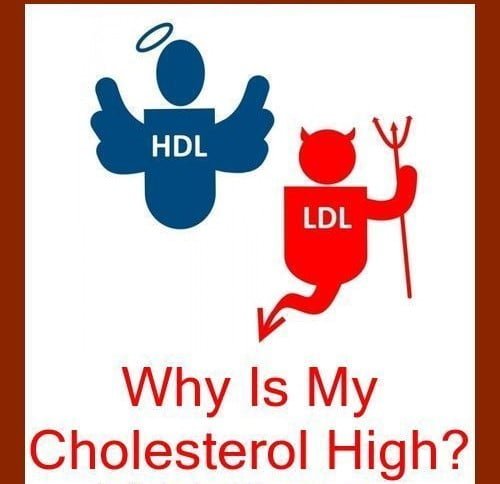Concerning high cholesterol
Cholesterol is a lipid, which is a fatty substance. It is necessary for the body’s normal functioning. Your body uses cholesterol to make cell membranes, hormones, and vitamin D.

The majority of the cholesterol in your blood comes from two sources:
- Cholesterol found in food
- Cholesterol produced by your liver
Hyperlipidemia, or having an abnormally high level of lipids in your blood, can have a negative impact on your health.
High cholesterol does not usually cause symptoms on its own, but it does increase your risk of serious health problems.
Concerning cholesterol
Proteins transport cholesterol in your blood. Lipoproteins are formed when the two combine. Lipoproteins are classified into two types.
High-density lipoprotein (HDL) transports cholesterol from cells to the liver. It is then either broken down or excreted as waste from the body. As a result, HDL is known as “good cholesterol,” and higher levels are preferable.
LDL (low-density lipoprotein) transports cholesterol to cells that require it. If there is too much cholesterol for the cells to use, it can build up in the artery walls, causing artery disease. As a result, LDL is referred to as “bad cholesterol.”
A blood test is used to determine the amount of cholesterol in the blood, both HDL and LDL.
The recommended cholesterol levels in the blood differ depending on whether you are at a higher or lower risk of developing arterial disease.
What is the point of lowering my cholesterol?
Evidence strongly suggests that high cholesterol can increase the risk of:
- Artery narrowing (atherosclerosis)
- Attack of the heart
- Stroke
- Transient ischemic attack (TIA) – also known as a “mini stroke” (PAD)
This is due to the fact that cholesterol can accumulate in the artery wall, restricting blood flow to your heart, brain, and the rest of your body. It also increases your chances of developing a blood clot somewhere in your body.
As your blood cholesterol level rises, so does your risk of developing coronary heart disease. During times of stress or physical activity, this can cause pain in your chest or arm (angina).
What is the cause of high cholesterol?
If you have high cholesterol, many factors can increase your chances of having heart problems or having a stroke.
- An unhealthy diet – specifically, eating a lot of saturated fat – is one of them.
- Smoking – acrolin, a chemical found in cigarettes, prevents HDL from transporting cholesterol from fatty deposits to the liver, resulting in artery narrowing (atherosclerosis)
- Having diabetes or high blood pressure (hypertension)
- A family history of stroke or heart disease
Familial hypercholesterolaemia is another inherited condition. Even healthy eaters can develop high cholesterol as a result of this.
When should I have my cholesterol levels checked?
Your doctor may advise you to have your blood cholesterol levels checked if you:
- Have coronary heart disease, a stroke or a mini-stroke (TIA), or peripheral arterial disease (PAD)
- Have a family history of coronary artery disease
- Have a close family member who suffers from a cholesterol-related condition, are overweight, have high blood pressure, diabetes, or another health condition that can raise cholesterol levels
What are my cholesterol levels supposed to be?
Blood cholesterol is measured in millimoles per litre of blood, which is often abbreviated to mmol/L.
Total cholesterol levels should, as a general rule, be:
- For healthy adults, 5mmol/L or less
- For those at high risk, 4mmol/L or less is recommended.
LDL levels should, as a general rule, be:
- For healthy adults, 3mmol/L or less
- For those at high risk, 2mmol/L or less is recommended.
A healthy HDL level is greater than 1mmol/L. A low HDL level may increase your risk of heart disease.
Your total cholesterol to HDL ratio can also be calculated. This is calculated by dividing your total cholesterol level by your HDL level. This ratio should, in general, be less than four, as a higher ratio increases your risk of heart disease.
Cholesterol is only one of several risk factors. The extent to which specific treatment is required will be determined by the presence of other risk factors, such as smoking and high blood pressure.
How can I reduce my cholesterol?
The first step toward lowering your cholesterol is to eat a healthy, balanced diet. It is critical to limit your intake of fatty foods.
Saturated fat-containing foods can be substituted for fruits, vegetables, and wholegrain cereals. This will also help to keep high cholesterol at bay.
Other lifestyle changes, such as regular exercise and quitting smoking, can also make a significant difference in lowering your cholesterol.
If these measures do not lower your cholesterol and you still have a high risk of developing heart disease, your doctor may prescribe a cholesterol-lowering medication, such as statins.
Your doctor will consider the possibility of statin side effects. The advantages of lowering your cholesterol must outweigh the disadvantages.

